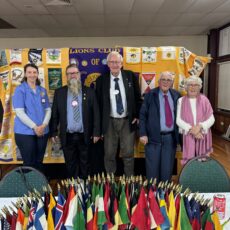Below is a copy of the speech delivered by Megan Crutcher, Jackson and Chelsea Humphries, and kindly shared with the Wee Waa News.
Anzac Day: World War II Veteran – Gunner George Joseph Humphries NX40602
September 1, 1939, marked the start of World War II with the destructive and violent Nazi invasion of Poland led by Germany’s Grand Chancellor, Adolf Hitler. In response Great Britain declared war on Germany in the days that followed, effectively committing the Commonwealth of Nations including Australia to the theatre of war.
Approximately 75 million individuals lost their lives during World War II, including 20 million military personnel and 60 million civilians who died from a variety of causes including mass-bombings, massacres, starvation, and many other effects.
Seventy-eight Australian women and 39,800 Australian men lost their lives in World War II.
Altogether around a million Australian men and women served throughout the war.
Our Australian government provided defence force support.
Military and medical personnel, Royal Australian Air Force resources and crews, along with Royal Australian Navy ships were deployed to fight alongside our allies.
By the end of World War II much of Europe, Asia and parts of Africa lay in ruins.
The combat and bombings of the war forever changed the landscape of cities and towns, scorched the countryside, and destroyed railroads, bridges, and other infrastructure.
Many years of fighting, sacrifice and loss ensued as the battles waged on.
The persistence and determination to defeat the AXIS nations saw the eventual surrender of Germany and a conclusion to the war when the United States government sanctioned the atomic bombings of Hiroshima and Nagasaki from a B-29 bomber that led to Japan’s surrender, concluding the war on all fronts.
In totality the war lasted six years and one day, concluding on September 2, 1945.
It was the dutiful acts and sacrifice of our everyday soldiers who volunteered from all parts of our nation that we gather here to celebrate and commemorate today.
So many of our families have historical connections to war, many had to face dreadful loss through the devastation of conflict, and our returned soldiers were to be forever affected by their experience of war and its futility.
Gunner George Joseph Humphries, better known to our family as ‘Pop George’ was a veteran of World War II.
Pop was born in Wee Waa on May 28, 1919 and spent his time working in the timber industry prior to enlisting in the defence force with some other Wee Waa boys on June 27, 1940 at Tamworth.
At the age of 21, Pop’s contribution to World War II began. After attending a series of training camps, he embarked with the 3rd Anti-Tank regiment on the 14th of November aboard the HM Troop Ship ‘Orion’, a 2300 tonne vessel bound for the Middle East, landing at Haifi, Palestine. More training ensued while the regiment awaited weapons. During leave time George was able to visit the city of Jerusalem to ‘have a bit of a look around’.
It wasn’t long before the regiment received weapons and within three days, they were sent to the front line at Tobruk crossing the desert on the back of trucks, receiving ammunition on arrival and learning how to use machine guns.
There were about 25 men per troop and normally four per truck.
The troops were soon engaged in battle providing support to troops retreating along the coast road to Cairo and charged with holding key positions from the advancing enemy.
It was during this period of battle that Pop lost his brother Hilton.
During their own bid to retreat, Pop’s truck was hit and they were picked up by an Indian truck whilst wandering the desert trying to find their way back to the coastal road. It was at this time they were spotted and machine gunned by German surveillance aircraft, eventually being captured by a German convoy.
From April 7, 1941 Pop became a prisoner of war when a German officer described as ‘a little man, Oxford educated, who spoke English as good as us, apologised at having to hand us over to the Italians’.
Pop and approximately 60 other soldiers were sent to the prison camp ‘Bardia’ where conditions were pretty bad, men became sick and were forced to drink contaminated water.
The Italians hated the Aussies due to propaganda at the time.
After three weeks the prisoners were shipped from Tripoli to Naples, Pop recollects the trip as ‘being a bit hairy as the English were firing on Italian ships passing by’.
Pop remained in Italian camps until Italy surrendered on the 8th of December 1943.
The remainder of the war saw Pop moved around a lot of the time between prisoner camps across Germany where they were put to work building railways and constructing factories during the time that Germany was facing air raids from the allies.
The prisoner camps were finally liberated by the ‘yanks’ with a ‘yank tank’ coming straight through the fence of a prisoner camp three kilometres from Nuremberg where Pop was being held.
From Germany Pop was returned to England where he was billeted for about 10 days, spending VE Day in England with the Aussies being treated really well by the English.
The final voyage home was by ship, ‘The Dominion Monash’ returning via the Panama Canal to Sydney to a great reception that included family, friends, press and TV cameras.
George was met and escorted home by his parents, sister Nita and future wife Eileen by train.
Pop’s recollections included many other stories and experiences that remained with him during his life and give us an insight into his time as a soldier and prisoner of war.
Pop’s formal Date of Discharge was August 7, 1945.
He is fondly remembered for his service by our family, and we proudly honour him, and the service of all our defence personnel each Anzac Day. We will remember them.











